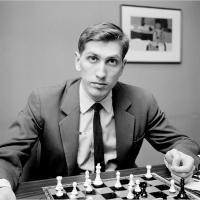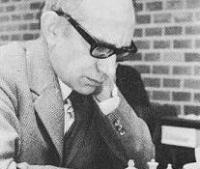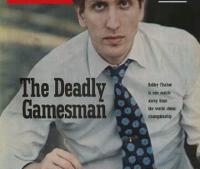
He Learned Directly from God, pt 3
[part 2]
In 1958, Fischer became the youngest grandmaster in history, at 15 years and 6 months. This record held until 1991 when it was broken by Judith Polgar. In 1959, in the Candidates Tournament Bled / Zagreb / Belgrade, he finished fifth to sixth, with 12.5 of 28; despite this mediocre performance, he was very flattered by a man (Botvinnik) who was usually very spare of praise: "This young man has a brilliant talent, I'm sure the U.S. GM has a great future."
On December 16, 1959, just before the1959-60 US Championship, Fischer decided not to play. He had demanded a public drawing of the pairings. Anthony Saidy was substituted for Fischer. On December 19, after it was agreed that the drawing would be made public in the future, Fischer decided to defend his title, and for the first time, he showed up in a suit. He wore a white shirt and a white tie. He had been encouraged by Pal Benko to dress well. He won the U.S. Championship for the third consecutive year, with 9 of 11.
In 1960 he tied for 1st-2nd place with Boris Spassky at Mar del Plata, Argentina, with 13.5 of 15, and afterwards Spassky said: "the U.S. champion plays blitz with pleasure and passion, the only thing that does not bring him pleasure is to lose in chess. When this happens, he returns the pieces to their places quickly, seeking revenge!" Fischer did poorly in Buenos Aires that same year, scoring 8.5 of 19. He only won 3 games; it was the worst result of his career. Pal Benko said that Fischer did horribly in the tournament "because he got caught up in women and sex." Afterwards, Fischer said the he would never mix women and chess together, and he kept the promise.
Then Fischer won a small tournament in Reykjavik with 3.5 of 4. In November, 1960, he played first board for the United States at the Chess Olympiad in Leipzig, East Germany. He finished with 13 of 18 and won the bronze medal for his individual result; the USA won the silver medal as a team result.
In January 1961, Bobby again won the U.S. Championship with 9 of 11, the fourth consecutive time.
In July he started a match with Sam Reshevsky and tied it with 2 wins, 7 draws, and 2 losses before negotiations broke down over the playing schedule and time of the start of each game. The match was discontinued. The games were played in New York and Los Angeles.
Bobby forfeited the match because the 12th game of the series was started at 11 a.m., and Bobby was not told of this time change. The game had been scheduled for play at the Beverly Hilton Hotel in Los Angeles on Sunday, August 13 at 1:30 pm. At 10 am that morning, he received a call that the playing time had been moved up to 11 am to accommodate the wishes of the principal patron, Mrs. Jacqueline Piatigorsky. She wanted the game to be over in time for her to attend a concert to be given that night by her husband, Gregory Piatigorsky. Bobby refused to play at 11 a.m. and cited a clause in his playing contract which stated that the playing time had to be acceptable to both parties. Reshevsky was declared the winner of the match, and received the winner's share of the prize fund.
In 1961, he took 2nd at the Alekhine Memorial in Bled, Yugoslavia, with 13.5 of 19, one point behind Tal. He defeated Tal in the 2nd round. Of Fischer's performance at Bled, Larry Evans said, "He has shown beyond the shadow of a doubt that he is a contender for the world title. Fischer has single-handedly broken the Russian iron grip on chess supremacy." Svetozar Gligoric said, "Bobby is going to be world champion."
Bobby Fischer chose not to play in the U.S. Championship of 1961-62, and in the next World Championship cycle, he won the 1962 Stockholm Interzonal by 2½ points, with 17.5 of 22. He was the first non-Soviet player to win an Interzonal since FIDE instituted the tournament in 1948. "His technique in the endgames with only 19 years is impeccable." (Kotov) In the Candidates Tournament of Curaçao 1962 he finished fourth with 14 of 27, the best result by a non-Soviet player, but well behind Tigran Petrosian's 17.5 of 27, and Efim Geller and Paul Keres both with 17 of 27. Tal fell very ill during the tournament, and had to withdraw. Fischer was the only contestant who visited him in the hospital.
Following his failure in the 1962 Candidates (at which five of the eight players, were from the Soviet Union), Fischer asserted in an August 1962 article in Sports Illustrated magazine, entitled "The Russians Have Fixed World Chess," that three of the Soviet players (Tigran Petrosian, Paul Keres, and Efim Geller) had a pre-arranged agreement to quickly draw their games against each other in order to save energy and to concentrate on playing against Fischer, and that a fourth, Viktor Korchnoi, had been forced to deliberately lose games to ensure that a Soviet player won the tournament. It is generally thought that the former accusation is correct, but not the latter. This is discussed further in the World Chess Championship 1963 article. Anatoly Karpov, later World Champion, wrote in his 1991 autobiography that Korchnoi had complained in the Soviet Union, shortly after the 1962 Candidates' event, about not being included in the colluding group of Soviets. Fischer also stated that he would never again participate in a Candidates' tournament, since the format, combined with the alleged collusion, made it impossible for a non-Soviet player to win.
Following Fischer's article, FIDE in late 1962 voted a radical reform of the playoff system, replacing the Candidates' tournament with a format of one-on-one knockout matches.






